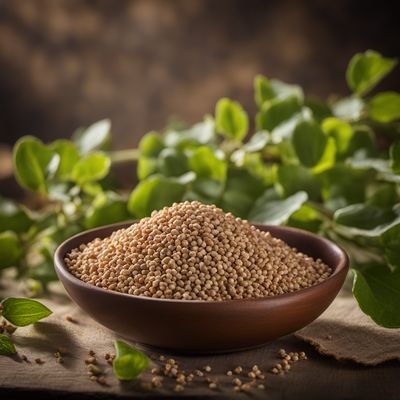
Ingredient
Knotgrass infusion leaves
The Herbal Elixir: Knotgrass Infusion Leaves
Knotgrass infusion leaves are characterized by their slender, lance-shaped leaves that are often used to make herbal infusions or teas. They have an earthy and slightly bitter taste, which can be mellowed with the addition of sweeteners or other herbs. The leaves are typically dried and crushed before being steeped in hot water to extract their beneficial compounds.
Origins and history
Knotgrass has a long history of use in traditional medicine systems, including Traditional Chinese Medicine and Ayurveda. It has been used to treat various ailments, such as digestive issues, skin conditions, and respiratory problems. Knotgrass is native to Europe but has since spread to other parts of the world, where it is considered a common weed. Despite its reputation as a weed, knotgrass has gained recognition for its potential health benefits and is now cultivated for its medicinal properties.
Nutritional information
Knotgrass infusion leaves are a rich source of antioxidants, including flavonoids and phenolic compounds, which help protect the body against oxidative stress. They also contain vitamins A, C, and K, as well as minerals such as calcium, magnesium, and potassium. Knotgrass infusion leaves are low in calories and carbohydrates, making them a suitable addition to a balanced diet.
Allergens
Knotgrass infusion leaves are not commonly associated with allergens, but individuals with known allergies to plants in the Polygonaceae family, such as buckwheat or rhubarb, may experience cross-reactivity.
How to select
When selecting knotgrass infusion leaves, look for dried leaves that are whole and intact, without any signs of discoloration or mold. Opt for organic or sustainably sourced leaves whenever possible to ensure the absence of pesticides or other contaminants.
Storage recommendations
To maintain the freshness and potency of knotgrass infusion leaves, store them in airtight containers in a cool, dry place away from direct sunlight. Avoid exposure to moisture or humidity, as this can cause the leaves to lose their flavor and beneficial properties.
How to produce
Knotgrass can be grown in home gardens or pots by sowing the seeds in well-draining soil and providing adequate sunlight and water. Regular pruning and weed control measures may be necessary to ensure optimal growth and leaf production.
Preparation tips
To prepare a knotgrass infusion, steep a teaspoon of dried leaves in a cup of hot water for 5-10 minutes. Strain the leaves and sweeten the infusion with honey or other natural sweeteners if desired. The infusion can be consumed hot or chilled and can be enjoyed on its own or blended with other herbs for a customized herbal tea blend.
Culinary uses
Knotgrass infusion leaves are primarily used in herbal remedies and teas. They can be consumed as a standalone infusion or blended with other herbs, such as chamomile or peppermint, to create unique flavor profiles. Knotgrass infusion leaves are also used in traditional medicine systems for their potential health benefits.
Availability
Knotgrass is commonly found in Europe, Asia, and North America, where it grows as a weed in gardens, lawns, and agricultural fields. It is also cultivated in some regions for its medicinal properties.
More ingredients from this category » Browse all

Oat infusion leaves
The Soothing Elixir: Oat Infusion Leaves

Ground ivy infusion leaves
"Nature's Herbal Elixir: Unveiling the Wonders of Ground Ivy Infusion Leaves"

Goldenrod infusion leaves
Goldenrod Elixir: Unlocking the Healing Power of Nature

Blackberry infusion leaves
The Essence of Blackberry Infusion Leaves

Cornflower infusion leaves
"The Vibrant Elixir: Unveiling the Beauty of Cornflower Infusion Leaves"

Heather infusion leaves
Heavenly Heather Elixir

Buckwheat infusion leaves
Nutty Elixir

Passion flower infusion leaves
"Nature's Tranquilizer: Unveiling the Secrets of Passion Flower Infusion Leaves"

Eucalyptus infusion leaves
Refreshing Eucalyptus: Aromatic Leaves for Infusions

Alpine ladies mantle infusion leaves
The Enchanting Elixir: Unveiling the Magic of Alpine Ladies Mantle Infusion Leaves

Boldo infusion leaves
The Ancient Herbal Elixir: Unveiling the Power of Boldo Infusion Leaves

Smooth rupturewort infusion leaves
The Tranquil Herbal Elixir